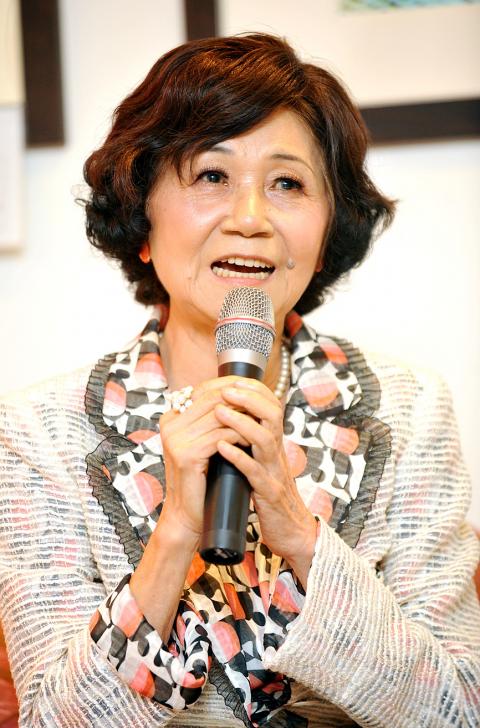Renowned 228 Incident remembrance advocate and musician Juan Mei-shu (阮美姝), who dedicated half of her life to seeking the truth about her father’s death, died on Monday at age 90, her family said on Monday.
Juan had diabetes, and her condition deteriorated on Wednesday last week, said Lin Li-jung (林麗容), her eldest daughter.
Juan’s father, Juan Chao-jih (阮朝日), was a victim of the massacre, an uprising that began on Feb. 27, 1947, and was violently suppressed by the then-Chinese Nationalist Party (KMT) government, with estimates of the death toll varying from 10,000 to 30,000 or more. The massacre marked the beginning of the White Terror period.

Photo: Chien Jung-fong, Taipei Times
Juan Chao-jih, then-general manager of the Taiwan Shin Sheng Daily News, was taken from his home by gunmen on March 12, 1947, and never seen again.
While studying music in Japan, Juan Mei-shu read Taiwanese academic Ong Iok-tek’s (王育德) Taiwan: A History of Agonies (台灣苦悶的歷史), which said that her father was killed by the government.
Ong’s allegation prompted Juan Mei-shu’s life-long pursuit of the truth about her father’s fate, which lead to the establishment of the Juan Mei-shu 228 Incident Memorial Archive, a collection of documents and artifacts related to the massacre, and the publication of two monographs on the subject: Years of Solitude and Suffering (孤寂煎熬四十五年) and A Cry in the Dark (幽暗角落的泣聲).
However, other than positing that Juan Chao-jih was almost certainly killed following his disappearance, no definitive answer has emerged from research by Juan Mei-shu or academics.
Upon hearing of Juan Mei-shu’s death, National Chengchi University history professor Hsueh Hua-yuan (薛化元), who is chairman of the 228 Memorial Foundation, said he grieved the death of a friend he was close to for three decades, adding that he had been unable to commemorate her on social media because he was at a loss for words.
“Her works vividly illustrated the experiences of 228 Incident victims’ families, and it is deeply saddening that she has passed before the truth about her father’s death could be revealed,” Hsueh said.
Mourners can pay their respects at Juan Mei-shu’s residence in Taipei starting today, and a public memorial is to be held at the Taipei Second Funeral Parlor on Dec. 17.

A preclearance service to facilitate entry for people traveling to select airports in Japan would be available from Thursday next week to Feb. 25 at Taiwan Taoyuan International Airport, Taoyuan International Airport Corp (TIAC) said on Tuesday. The service was first made available to Taiwanese travelers throughout the winter vacation of 2024 and during the Lunar New Year holiday. In addition to flights to the Japanese cities of Hakodate, Asahikawa, Akita, Sendai, Niigata, Okayama, Takamatsu, Kumamoto and Kagoshima, the service would be available to travelers to Kobe and Oita. The service can be accessed by passengers of 15 flight routes operated by

MORE FALL: An investigation into one of Xi’s key cronies, part of a broader ‘anti-corruption’ drive, indicates that he might have a deep distrust in the military, an expert said China’s latest military purge underscores systemic risks in its shift from collective leadership to sole rule under Chinese President Xi Jinping (習近平), and could disrupt its chain of command and military capabilities, a national security official said yesterday. If decisionmaking within the Chinese Communist Party has become “irrational” under one-man rule, the Taiwan Strait and the regional situation must be approached with extreme caution, given unforeseen risks, they added. The anonymous official made the remarks as China’s Central Military Commission Vice Chairman Zhang Youxia (張又俠) and Joint Staff Department Chief of Staff Liu Zhenli (劉振立) were reportedly being investigated for suspected “serious

Taiwanese and US defense groups are collaborating to introduce deployable, semi-autonomous manufacturing systems for drones and components in a boost to the nation’s supply chain resilience. Taiwan’s G-Tech Optroelectronics Corp subsidiary GTOC and the US’ Aerkomm Inc on Friday announced an agreement with fellow US-based Firestorm Lab to adopt the latter’s xCell, a technology featuring 3D printers fitted in 6.1m container units. The systems enable aerial platforms and parts to be produced in high volumes from dispersed nodes capable of rapid redeployment, to minimize the risk of enemy strikes and to meet field requirements, they said. Firestorm chief technology officer Ian Muceus said

Alain Robert, known as the "French Spider-Man," praised Alex Honnold as exceptionally well-prepared after the US climber completed a free solo ascent of Taipei 101 yesterday. Robert said Honnold's ascent of the 508m-tall skyscraper in just more than one-and-a-half hours without using safety ropes or equipment was a remarkable achievement. "This is my life," he said in an interview conducted in French, adding that he liked the feeling of being "on the edge of danger." The 63-year-old Frenchman climbed Taipei 101 using ropes in December 2004, taking about four hours to reach the top. On a one-to-10 scale of difficulty, Robert said Taipei 101